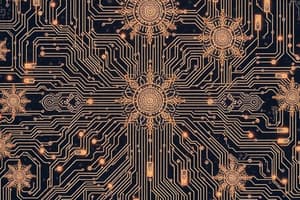Podcast
Questions and Answers
What are the two classes of logic circuits mentioned in the text?
What are the two classes of logic circuits mentioned in the text?
Combinational Circuits and Sequential Circuits
What is the main difference between Combinational and Sequential circuits?
What is the main difference between Combinational and Sequential circuits?
Output of a Combinational circuit depends only on input, while output of a Sequential circuit depends on current inputs and previous ones (stored in memory)
Give examples of the types of functions performed by Combinational Logic circuits.
Give examples of the types of functions performed by Combinational Logic circuits.
Arithmetic & logical functions (adder, subtractor, comparator), data transmission (decoder, encoder, multiplexer, de-multiplexer), code converters (BCD, grey code, 7-segment)
How can the function of a circuit be expressed?
How can the function of a circuit be expressed?
What defines the state of a Sequential circuit?
What defines the state of a Sequential circuit?
Explain the main characteristics of a combinational circuit and provide an example of a combinational circuit.
Explain the main characteristics of a combinational circuit and provide an example of a combinational circuit.
What is the difference between a combinational circuit and a sequential circuit? Provide an example of each.
What is the difference between a combinational circuit and a sequential circuit? Provide an example of each.
How is the function of a combinational circuit analyzed, and what are the possible ways to express its function?
How is the function of a combinational circuit analyzed, and what are the possible ways to express its function?
What are the different classifications of combinational logic mentioned in the text? Provide an example for each classification.
What are the different classifications of combinational logic mentioned in the text? Provide an example for each classification.
Explain the concept of feedback in combinational circuits and its impact on the output.
Explain the concept of feedback in combinational circuits and its impact on the output.
Flashcards are hidden until you start studying
Study Notes
Classes of Logic Circuits
- Logic circuits are classified into Combinational Circuits and Sequential Circuits.
Main Differences Between Combinational and Sequential Circuits
- Combinational Circuits: Output depends solely on current input values.
- Sequential Circuits: Output depends on current inputs and previous states (history).
Functions of Combinational Logic Circuits
- Perform arithmetic operations (e.g., addition or subtraction).
- Execute logic operations (e.g., AND, OR, NOT).
- Implement data routing functions (e.g., multiplexers and demultiplexers).
Expression of Circuit Functions
- Circuit functions can be expressed using Boolean algebra or truth tables.
State Definition in Sequential Circuits
- The state of a Sequential Circuit is defined by the stored information or memory elements which retain outputs based on past inputs.
Characteristics and Example of Combinational Circuits
- Characteristics include:
- No memory elements, output purely from current inputs.
- All inputs are processed simultaneously.
- An example is an Adder, which adds two binary numbers to produce a sum.
Difference Between Combinational and Sequential Circuits
- Combinational circuits do not have memory elements; outputs depend only on current inputs.
- Sequential circuits incorporate memory elements; outputs depend on both current inputs and past states.
- Example of a Combinational Circuit: Multiplexer
- Example of a Sequential Circuit: Flip-Flop
Analysis and Expression of Combinational Circuit Functions
- Functions are analyzed using:
- Truth tables to outline input-output relationships.
- Karnaugh maps for simplification.
- Boolean expressions for logical representation.
Classifications of Combinational Logic
- Common classifications include:
- Arithmetic Circuits (e.g., Adders, Subtractors)
- Data Routing Circuits (e.g., Multiplexers)
- Code Conversion Circuits (e.g., Encoders, Decoders)
Concept of Feedback in Combinational Circuits
- Feedback occurs when outputs are routed back as inputs.
- It can create dependencies where current outputs influence future inputs, transforming the circuit behavior.
- Feedback can complicate output predictability and is often associated with Sequential Circuits rather than Combinational Circuits.
Studying That Suits You
Use AI to generate personalized quizzes and flashcards to suit your learning preferences.





